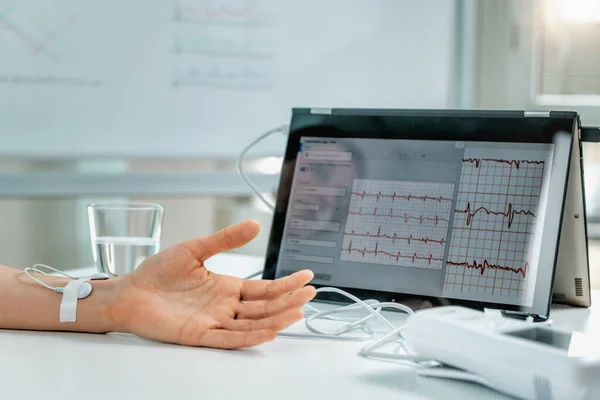Biofeedback Therapy
What is Biofeedback?
The definition of biofeedback as adopted by Biofeedback Certification International Alliance (BCIA) and The Association for Applied Psychophysiology and Biofeedback, Inc. (AAPB) is:
“Biofeedback is a process that enables an individual to learn how to change physiological activity for the purpose of improving health and performance. Precise instruments measure physiological activity such as brainwaves, heart function, breathing, muscle activity, and skin temperature. These instruments rapidly and accurately ‘feed back’ information to the user. The presentation of this information – often in conjunction with changes in thinking, emotions, and behavior – supports desired physiological changes. Over time, these changes can endure without continued use of the instrument.”
The American Psychological Association (APA) approved biofeedback as a treatment proficiency in 2019.

Frequently Asked Questions
Biofeedback FAQs
How Does Biofeedback Work?
Biofeedback is a training method that can help you become more aware of the effects of stress and tension on your body. It allows you to consciously change and control your body’s biological functions which usually are involuntary. When you can see your body’s vital processes (breathing, heart rate, temperature) on a computer, it helps you override your automatic reactivity and learn to relax intentionally. Much of this can be accomplished through slow-paced diaphragmatic breathing, which helps to create a balance between our parasympathetic nervous system (which is responsible for relaxation and digestion) and the sympathetic nervous system (which is responsible for the stress or “flight or fight” response). Benefits of slow-paced diaphragmatic breathing include:
- Mind/body balance
- Boost immune system response
- Increases alertness
- Promotes relaxation
- Trains the autonomic nervous system to be less impacted by mental or physical stress
- Decreases symptoms associated with depression, anxiety, panic disorder, post-traumatic stress disorder, ADHD, and insomnia
- Strengthens the “rest and digest” system, reduces overactive “fight or flight” response
- Indirectly controls heart rate
- Reduces muscle tension
- Lowers blood pressure
How is Biofeedback Useful?
Our bodies are constantly trying to maintain a certain level of homeostasis. Biofeedback is used for problems caused or worsened by physical or mental stress. When mental and physical tension interacts, this can create or maintain symptoms over time. Biofeedback can be used in combination with psychotherapy to aid in the treatment of mental health disorders or as a stand-alone, bio-medical service that does not include standard talk-therapy elements. Conditions managed with biofeedback training include:
- Stress
- Anxiety
- Depression
- Chronic pain
- Tension headache and migraine
- Muscle tension
- Hypertension/high blood pressure
- Insomnia
- Raynaud’s Syndrome
- Irritable bowel syndrome (IBS)
- TMJ/TMD
What Can I Expect From a Biofeedback Session?
During a biofeedback session, the therapist determines a specific treatment plan for your presenting issue and predominant symptoms. The therapist places electrodes, which are noninvasive and painless, on different parts of your body. These sensors measure and continuously monitor your physiological states, such as heart rate, breathing pace, muscle tension, and skin temperature.
This information is then relayed back to you on a computer screen so you can observe how your physiological state changes in various conditions. Through this feedback, you can learn to control physiological reactions by changing your emotions, thoughts, and behavior. Through consistent practice, these changes can last without biofeedback equipment. Because biofeedback is a self-management tool, how well and quickly it works is up to you. A typical biofeedback session lasts 45-50 minutes. The number of sessions will be determined by you and your therapist and the condition for which you are seeking treatment.

